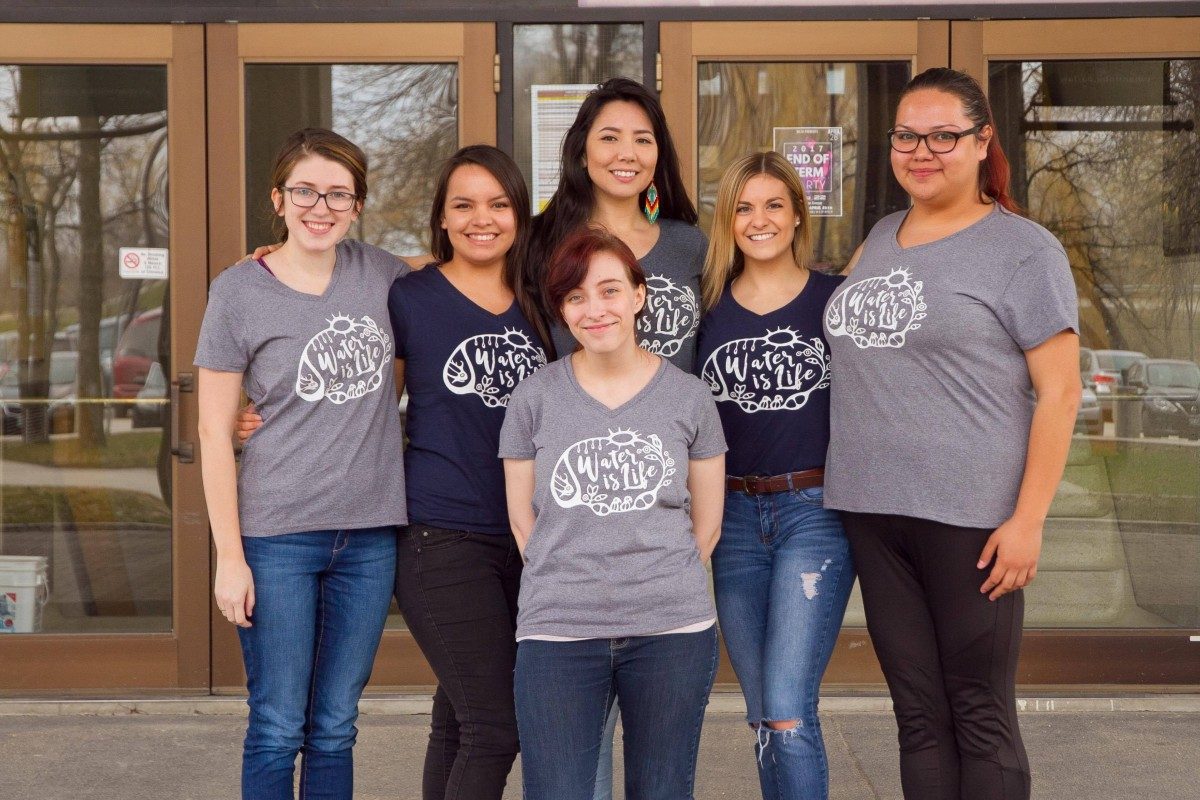
Student Pipeline Action Committee members L-R: Amelia Peterson (VP Administration), Alyssa Bird (VP Media & Marketing), Danielle H. Morrison (President), Samantha Gergely (Founding Member), Raven-Dominique Gobeil (Founding Member), Bethany Hutlet (in the front, VP Events).
Morrison, SPAC supporting action against pipelines in North America
Danielle Morrison has always had a deep connection to the environment. This comes from her upbringing, as her dad was a member of the Midewin society – an Indigenous group made up of spiritual advisors and healers. Because of this, she grew up with traditional teachings dealing with the responsibility to protect the water, land and animals.
Originally from Kenora in Treaty 3 territory, Morrison moved to Ottawa when she was 18 to do her undergraduate degree. During her time in the nation’s capital she began to feel very isolated from her community and her culture.
One of the ways she remedied this was by working with Indigenous organizations in the city, such as the Assembly of First Nations, where she helped within the Residential Schools unit. Her primary task was to aid Survivors in filling out forms dealing with compensation for abuse.
“There wasn’t a lot of trust in lawyers at that time. There was a lot of corrupt practice going on where survivors were being re-traumatized in the system, and told that they would get money and be given loans,” Morrison says.
“People were just jaded by the legal system, so they needed something that was more culturally appropriate, and that was what we provided.”
It was through this job that Morrison became inspired to pursue law school, getting unconditional acceptance to the University of Manitoba in 2016.
As an Indigenous student, she was deeply affected by particular issues discussed in class.
“During constitutional law, when the discussion of Aboriginal rights and Aboriginal title came up, and duty to consult when there’s land that’s being encroached on by resource extraction, we [Indigenous students] all took that very personally,” she says.
“You turn on the television and you see people who have no choice but to get to the frontlines and protect their lands. We thought, what are we doing in law school? We should be out there helping them.”
With this in mind, Morrison, along with a handful of fellow first-year law students, formed the Student Pipeline Action Committee (SPAC) in January of 2017. The group’s goal is to support action and resistance against pipelines in North America, as well as further the dialogue regarding the human impacts of resource extraction.
“In law school, we spend a lot of time reading case law and reading legislations, and I think it’s easy to forget about how that plays out for people on the frontlines,” Morrison says.
“It becomes more palpable when you hear it from individuals who were at the camps themselves, or who had their human rights violated. It kind of inspires people to think more critically about the law in general.”
Events
On March 29, the SPAC hosted a panel on Indigenous law in conversation and practice, as part of Indigenous Awareness Month at the U of M. The event was held in Robson Hall’s Moot Court Room B.
This event is just one of many that the group has put in since its inception. Their first “Water is Life” fundraising campaign generated over $5,000 for groups such as the Water Protectors Legal Collective. This past November, the SPAC also hosted an all-Indigenous speaker panel, which brought together legal, grassroots and frontline perspectives on the topic of pipelines and resource extraction.
The group’s efforts have also made their way outside of the university, as a high school student recently approached the SPAC asking how to start the committee at their school.
“I thought that was great,” Morrison says. “[The student] is only 16, so the fact that the work we do inspires someone that young to start work within their own community, I think says a lot to the potential for this group.”






